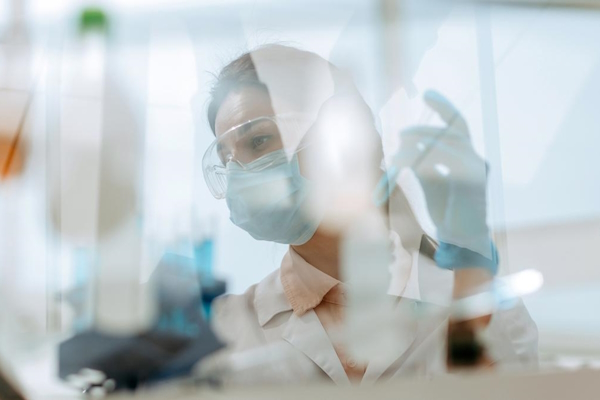
Everyone who works in the pharmaceutical track and trace sector specifically, and life sciences sector more generally, will remember the dark days of 2020 and the dawning of the COVID-19 pandemic.
Indeed, its after-effects are still reverberating through both industries today – both the good and the bad. The bad is, of course, obvious. On top of the obviously devastating, direct loss of lives across the globe, many people have been left with life-limiting medical issues. And from a business point of view, many firms are still recovering financially to this day. The fact is that they can arguably be considered the lucky ones when you consider that many businesses collapsed as a direct result of worldwide lockdowns and many other forms of COVID-induced financial pressures.
However, there have been some more positive effects too, at least for the pharmaceutical sector. We are starting to go in the right direction when it comes to working in a much more open, collegiate way. The foundations for this were directly laid when the sector had to cooperate to deliver groundbreaking vaccines to all four corners of the globe in record-breaking timescales. This collaboration and cooperation should be seized upon. It cannot fade into a distant memory – especially when there is every possibility this openness will be the secret weapon the world needs should there ever be another global pandemic.
We should also take a leaf out of the book of other sectors, notably food and the automotive industries. We are routinely witnessing examples within these sectors of separate firms cooperating for the good of the end customer. Just think for a moment of the multiple times you see a very specific brand from one firm available for sale inside the premises of what might be considered a competitor.
Is Disease X waiting in the wings?
While not wanting to dwell on negativity, sometimes facts need to be faced head-on.
One of these is the recent, concerning viewpoint voiced by the World Health Organisation’s top doctor, Tedros Adhanom Ghebreyesus, who is reported as stating a fresh pandemic even deadlier than COVID-19 could be on the horizon, with humanity not remotely prepared to deal with it. He asserts that “Disease X” could wreak havoc across the globe because people have failed to learn lessons from previous pandemics.
He further said that no one can predict where or when Disease X will emerge, but its existence “is a matter of when, not if.” With this warning from such an influential source, and with the lessons learned from COVID-19 still being a very recent memory, let’s explore the main lessons that the serialization sector can learn to ensure we are the exception to Dr. Tedros’ rule, and show we HAVE learned lessons from previous pandemics.
Why collaboration and data sharing are so important – for all our futures
The fact is that the COVID pandemic shone a spotlight onto the vulnerability of the world in the face of a serious pandemic.
Industries, governments, and countries were simply not prepared for such a devastating pandemic that appeared seemingly out of nowhere. Lockdowns were introduced to prevent the virus from spreading, but this led to major logistical issues. Problems with sourcing the quality and quantity of supplies needed, and ongoing issues with getting them distributed efficiently, reverberated right across the world.
If we are unlucky enough to experience another pandemic, will it really be acceptable to suffer from the same problems? The simple answer, after the “dress rehearsal” of the Covid pandemic, is “no”. The pharmaceutical sector will need to demonstrate agile production methods and watertight, efficient, smooth supply chains that can spring into action at a moment’s notice. Openness and data sharing within track and trace will provide a direct way for this to be achieved. It will provide a way of replacing those complex and inflexible serialization solutions that are unable to communicate with other solutions, and could become directly responsible for delaying a swift roll-out of the essential vaccine.
Plug and produce is a useful example to highlight here. This is where a production system can automatically identify a new or modified component and integrate it correctly into the running production process without the need for manual efforts or design changes. In other words, plug and produce is rapidly rising to prominence as a method of automating production lines and reducing the overall time and effort needed to reconfigure a manufacturing system. A user can add and remove devices without having to do manual configuration, and without knowledge of computer hardware. Such innovations will be essential for enabling a swift, collegiate roll-out.
Many providers use specific software which can only be used with their hardware. Additionally, the hardware itself could be extremely outdated. Today’s pharmaceutical sector is defined by technology. We are living in the Digital 4.0. era of hyper-connectivity, robotics and machines which can communicate directly with each other. In other words, if a firm does not invest in the correct technology, and systems which can adapt easily in the future, they will likely experience a high degree of operational inefficiency and run a very real risk of losing ground directly to their competitors.
In a scenario whereby the entire pharmaceutical sector needs to work together, with shop floors across the world needing to combine resources, the disastrous consequences of vendor lock-in or outdated systems will be clear to see. Instead, now is the time to seize the endless advantages that technology is presenting in today’s Digital 4.0. age. Cloud computing and Edge technology – whereby client data is processed at the periphery of the network, as close to the originating source as possible – has opened a host of possibilities. It has given rise to powering automatic, time-sensitive supply chain processes in warehouses, factories, and manufacturing facilities. The need for human management is reduced, yet efficiency and optimal outcomes are the new normal.
Local production
One of the major issues highlighted by the pandemic was the fact the globe had become overly reliant on just one geography – namely China – for the supply of medication and medical equipment. Not only did this cause a damaging bottleneck, placing an inordinate amount of stress on the rigid supply chains connected with Chinese production, it placed an unrealistic demand on resources.
Fast-forward to today and we are now seeing a move towards local production and sourcing through the repatriation of supply chains into Europe and the USA. This repatriation is vital. It serves as another step towards industry cooperation and signals confidence in the capabilities of specific regions as important centres for pharmaceutical production.
ESG openness
Support of global ESG initiatives is an important step forward to stamping out the issue of fake drugs, a recurring problem that continues to blight the pharmaceutical industry, and one that could easily lead to future counterfeit “Disease X” vaccines doing more harm than good in the event of another pandemic.
The UN Charter on sustainable development is a clear example of moves that are being established to ensure a safer and more responsible world which we can all enjoy. All firms should be familiar with its contents and should be doing all they can to adhere to them for any future collective battle against a global pandemic. For example, track and trace systems directly correlate to achieving Sustainable Development Goal (SDG) 3: Good Health and Wellbeing, by allowing access to genuine, safe, quality, and affordable medicines and vaccines for all.
Conclusion
Openness is vital – for pharmaceutical serialization specifically, and for the pharmaceutical sector generally.
As we have already noted, we can learn a lot from other sectors, such as food and the automotive sectors. Furthermore, a refusal to cooperate shows that a firm does not have the best interests of humanity at its heart – and should be viewed with suspicion. Yes, competition is of course healthy, and the protection of a firm’s IP and systems remains important – to a degree. Just imagine, if the world was waiting for a vaccine to be shipped globally in a time-sensitive manner, would you want to be part of a firm that refuses to cooperate with its peers?
I know I wouldn’t.


Alf Goebel has been the CEO of advanco since 2019. He has overseen a significant period of expansion in advanco’s evolution, firmly establishing it as one of the globe’s leading providers of levels 2 to 5 item-level serialization for the pharmaceutical sector.
An internationally recognised expert on regulated track and trace, Alf is an established industry commentator and speaks at pharmaceutical and serialization events across the world. He is also a board member of OPEN-SCS, the industry body responsible for promoting common standards across the pharmaceutical serialization sector.
©
SecuringIndustry.com
 | back to top
| back to top






